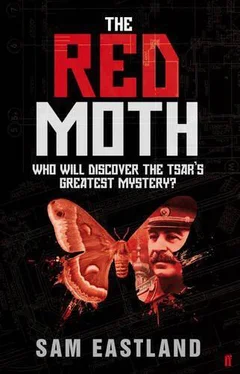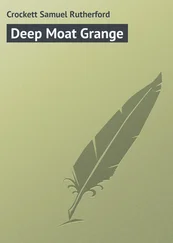Sam Eastland - Red Moth
Здесь есть возможность читать онлайн «Sam Eastland - Red Moth» весь текст электронной книги совершенно бесплатно (целиком полную версию без сокращений). В некоторых случаях можно слушать аудио, скачать через торрент в формате fb2 и присутствует краткое содержание. Жанр: Исторический детектив, на английском языке. Описание произведения, (предисловие) а так же отзывы посетителей доступны на портале библиотеки ЛибКат.
- Название:Red Moth
- Автор:
- Жанр:
- Год:неизвестен
- ISBN:нет данных
- Рейтинг книги:3 / 5. Голосов: 1
-
Избранное:Добавить в избранное
- Отзывы:
-
Ваша оценка:
- 60
- 1
- 2
- 3
- 4
- 5
Red Moth: краткое содержание, описание и аннотация
Предлагаем к чтению аннотацию, описание, краткое содержание или предисловие (зависит от того, что написал сам автор книги «Red Moth»). Если вы не нашли необходимую информацию о книге — напишите в комментариях, мы постараемся отыскать её.
Red Moth — читать онлайн бесплатно полную книгу (весь текст) целиком
Ниже представлен текст книги, разбитый по страницам. Система сохранения места последней прочитанной страницы, позволяет с удобством читать онлайн бесплатно книгу «Red Moth», без необходимости каждый раз заново искать на чём Вы остановились. Поставьте закладку, и сможете в любой момент перейти на страницу, на которой закончили чтение.
Интервал:
Закладка:
‘Enough to want him dead,’ said Stalin. ‘I grant you that.’
‘And he had made up his mind to see it through to the end, on his own, without his brother’s assistance.’
Stalin returned to his desk. ‘Are you telling me that, based on this letter, you believe that Polina Churikova is the person we’ve been looking for all along?’
‘I cannot say for certain, Comrade Stalin, but I think so.’
‘But she has proved her worth to us! She broke the Ferdinand code! Why would she do that if she was working for the Germans?’
‘I don’t know.’
‘And so what if she kept her findings secret?’ Stalin continued. ‘Perhaps she didn’t want one of her colleagues to see the results before she was finished. These academics are constantly pilfering each other’s work. And it’s about glue, Kirov! What does that have to do with amber?’
‘As you know, Comrade Stalin, those thousands of fragments of amber were mounted on panels. For that, they must have used glue, which is now over two hundred years old. In that time, it has grown too fragile to survive the journey to Siberia. That’s why they had to leave behind the panels. Lieutenant Churikova must have found out about this, probably from Valery Semykin when she went to visit him in prison.’
‘And you think she found the solution for transporting the panels after all? If that’s true, then why wouldn’t she have shared it with us?’
‘Because I think she planned to share it with the Germans,’ replied Kirov. ‘The painting was a message to Professor Engel, warning him that the amber was still hidden in the walls of the Catherine Palace. She must have been working on a way to transmit the results of her experiment. As a cryptographer, she could just as easily have sent a coded message to the enemy as she could decipher one we’d intercepted. But it had to be a message which Engel‚ and Engel alone‚ could understand‚ even though he has no background in cryptography. When the Inspector and I met her at the Ostankinsky station and she learned that the painting had been captured she had to find another way to get the information to Engel. That’s why she volunteered to go across the lines, so she could deliver the message in person.’
‘And now‚’ said Stalin‚ ‘thanks to us‚ that is exactly what she’ll do.’
‘Is there any way we can get word to the Inspector?’ asked Kirov.
Stalin shook his head. ‘Out of the question. The best we can hope for is that he figures it out on his own, and kills the lieutenant before she gets to Engel.’
‘He won’t hurt Churikova,’ replied Kirov. ‘I don’t think he can.’
With a gravelly sigh, Stalin reached into his pocket for his crumpled box of cigarettes. Opening its dented cardboard lid, he fitted one of the white sticks between his lips and lit it with the gold lighter he always carried with him. ‘Let us hope you’re mistaken,’ Stalin whispered as he exhaled a jet of smoke towards the ceiling, ‘but you aren’t, and we both know it.’
‘What treasure?’
‘What treasure?’ asked Stefanov. ‘Where could it possibly be hidden?’
‘There is a secret room under this house‚’ replied Pekkala. ‘On the recommendation of his head of security, the Tsar ordered hiding places built into every residence on the estate.’
‘Hiding places?’
‘He called them “priest holes”, after the ones that were built for Catholics in England during the reign of Queen Elizabeth I. The hiding place in this cottage was based on a design used at Rangeley Manor, a house visited by the Tsar during a trip to see his cousin, King George V. The original was built by a Jesuit carpenter named Nicholas Owen, who was later tortured to death on the rack at the Tower of London.’ Pekkala nodded towards the hearth. ‘The entrance is right over there.’
Stefanov stared at the empty stone fireplace. ‘But there’s nowhere to put a hiding place.’
‘So it was made to appear,’ Pekkala replied, ‘but in fact the wall there is twice as thick as any other wall in the house. It contains a narrow stairway that leads down to the hidden room.’
‘What’s it like, this room?’
‘I don’t know,’ replied Pekkala. ‘I never went down there, but the Tsar did. He knew I did not like to be confined so, as a challenge, he left behind a bottle of his finest slivovitz, hoping the reward of one of his precious bottles of brandy might lure me down into that tomb.’ Climbing to his feet, Pekkala walked over to the fireplace. Dropping to one knee, he reached up into the chimney. Tucked into a recess in the masonry, he found a metal ring attached to a chain. Pekkala grasped the ring and pulled, hearing the chain rattle somewhere deep inside the chimney. There was a dull clunk in the brickwork at the back of the hearth. He brushed his hand along the bricks until he came to the place where the bricks did not join evenly. With the tips of his fingers, he prised back a small doorway faced with brick‚ which had been set into an iron frame.
Behind him, Stefanov looked on in amazement. ‘Do you think the slivovitz might still be down there?’
‘Find out for yourself‚’ replied Pekkala. ‘But be quick. They could be here any minute.’
Stefanov struck a match and‚ holding it out in front of him‚ made his way down into the blackness of the priest hole. The wavering flame illuminated a flight of ten steps hewn into the khaki-coloured rock. At the base of the steps, a chamber opened out into the darkness.
At the sight of it, Pekkala felt his throat tighten. The blood began pulsing in his temples.
Moving away from the priest hole, Pekkala walked over to the window and peered through the gaps in the wooden shutters. As he looked out at the pathway which ran beside the cottage, a movement outside caught his eye. A figure walked slowly down the path. From the silhouette, he could tell it was a German soldier, his rifle unshouldered and held at the ready.
Pekkala’s heart slammed into his chest. Guessing that the soldier was likely part of a patrol and that they might decide to take a look inside the cottage, he ducked into the fireplace and slithered into the entrance of the priest hole‚ struggling against the claustrophobia which sent bile climbing into the back of his throat.
The glow of Stefanov’s match flickered at the bottom of the stairs. As Pekkala reached out to close the door of the priest hole, he could hear someone in hobnailed boots stepping into the house by the same entrance he had used. At that same moment Stefanov appeared from the shadows below, a dusty bottle gripped in his hand. He was smiling, but one look at the expression on Pekkala’s face told him that something had gone very wrong. With one sharp breath he extinguished the match and the priest hole was plunged into darkness.
Lying on his stomach, with his legs braced against the stone steps, Pekkala drew the Webley revolver from its holster. Although the door was closed, a tiny gap left between the brickwork and the floor, presumably for ventilation, showed as a faint, velvety blue line of half-light. Even with his head pressed to the floor, Pekkala could barely see out from under the gap, but he could make out the shadowy form of a man moving around the room. He heard the cautious pacing of boots upon the wooden floor. Then a second shadow appeared and after that a third.
Without a word spoken between them, the men searched the cottage, moving like ghosts from room to room. Then they met back in front of the fireplace.
‘Empty,’ said one of the soldiers.
One man paused to light a cigarette‚ flicking the dead match into the fireplace.
Pekkala let his breath trail out with relief, knowing that the patrol would now be moving on. A second later, however, he heard the voice of Gustav Engel.
Читать дальшеИнтервал:
Закладка:
Похожие книги на «Red Moth»
Представляем Вашему вниманию похожие книги на «Red Moth» списком для выбора. Мы отобрали схожую по названию и смыслу литературу в надежде предоставить читателям больше вариантов отыскать новые, интересные, ещё непрочитанные произведения.
Обсуждение, отзывы о книге «Red Moth» и просто собственные мнения читателей. Оставьте ваши комментарии, напишите, что Вы думаете о произведении, его смысле или главных героях. Укажите что конкретно понравилось, а что нет, и почему Вы так считаете.











